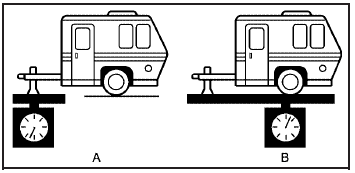Weight of the Trailer Tongue
The tongue load (A) of any trailer is an important weight to measure because it affects the total gross weight of the vehicle. The Gross Vehicle Weight (GVW) includes the curb weight of the vehicle, any cargo carried in it, and the people who will be riding in the vehicle. If there are a lot of options, equipment, passengers or cargo in the vehicle, it will reduce the tongue weight the vehicle can carry, which will also reduce the trailer weight the vehicle can tow. If towing a trailer, the tongue load must be added to the GVW because the vehicle will be carrying that weight, too. See Loading the Vehicle for more information about the vehicle’s maximum load capacity.

Using a weight-carrying hitch, the trailer tongue (A) should weigh 10 to 15 percent of the total loaded trailer weight (B).
After loading the trailer, weigh the trailer and then the tongue, separately, to see if the weights are proper.
If they are not, adjustments might be made by moving some items around in the trailer.
See also:
Using the Delete Command
The delete command is used to delete specific name tags.
To delete name tags:
1. Press
.
► For vehicles without a navigation system, the system responds “Ready,” followed by a tone.
...
Interactive Drive Control System
Buick Regal's Interactive Drive Control System chassis technology (available
on models with the available 2.0L turbo engine) offers enhanced vehicle
stability and greater driving safety. It is des ...
Your Responsibility
Increase the volume of the radio if the OnStar Advisor cannot be heard.
If the light next to the OnStar buttons is red, the system may not be functioning properly. Push and request a vehicle diagnos ...


